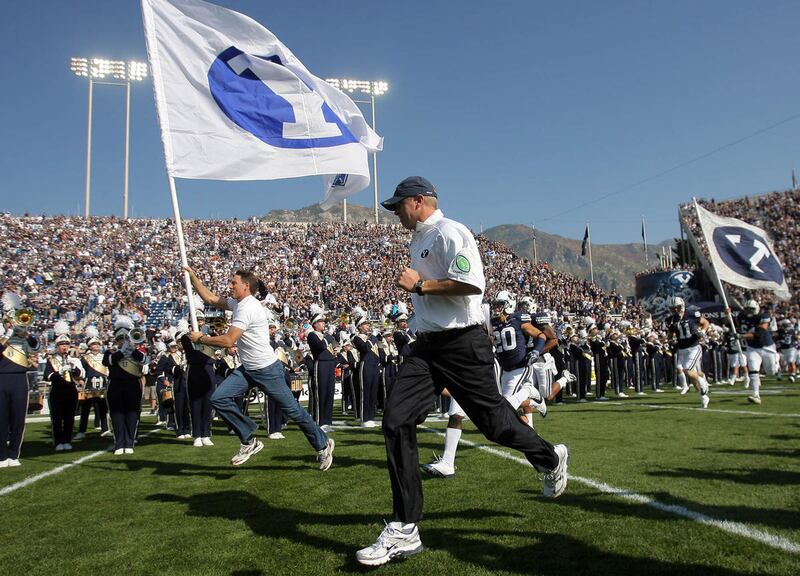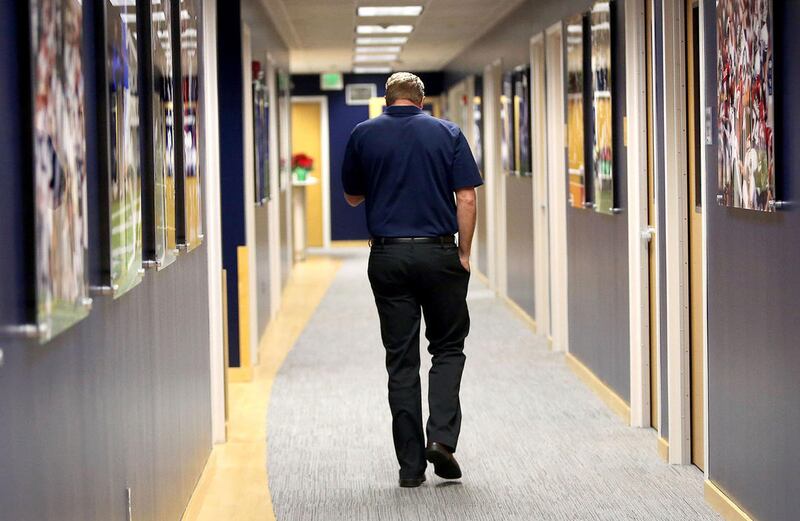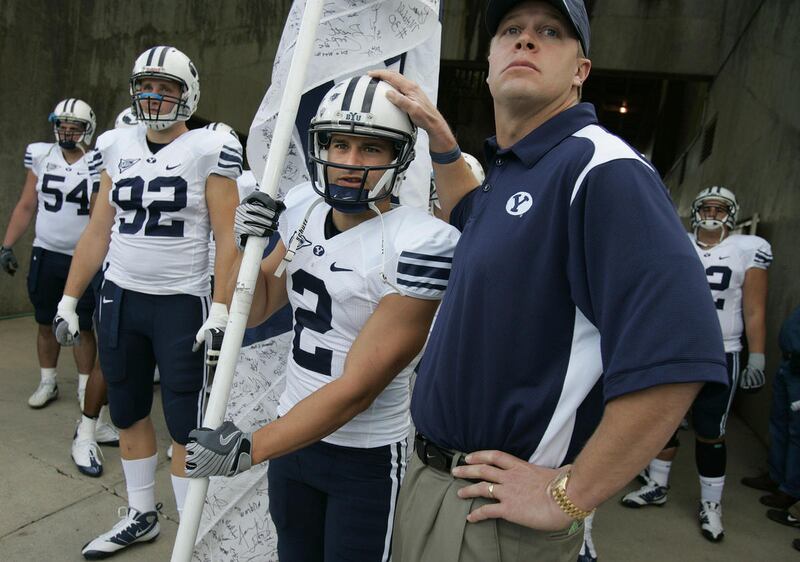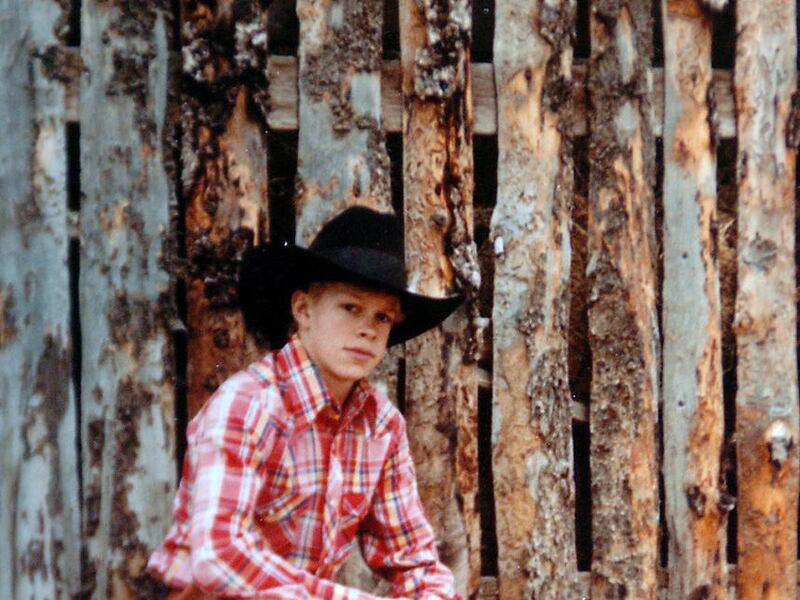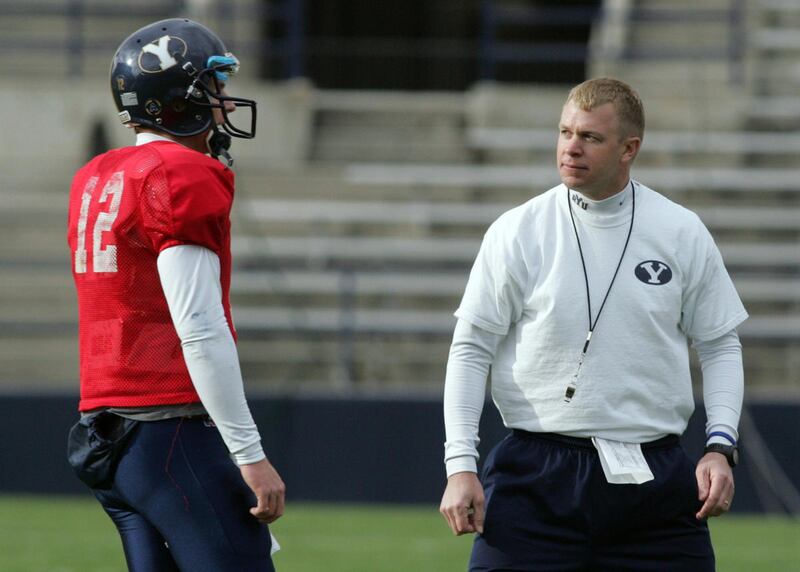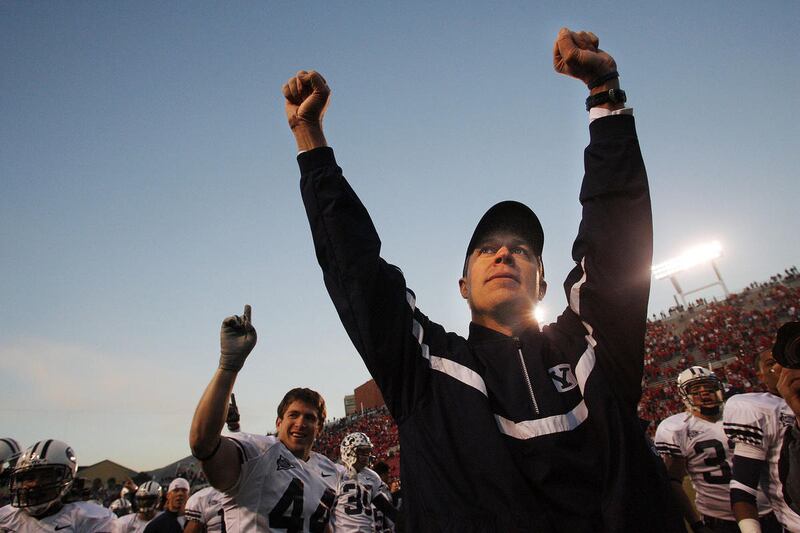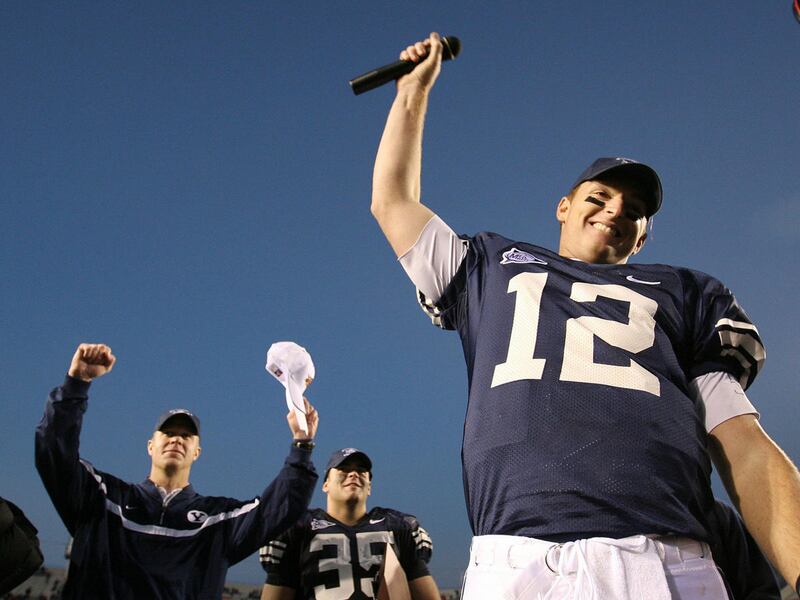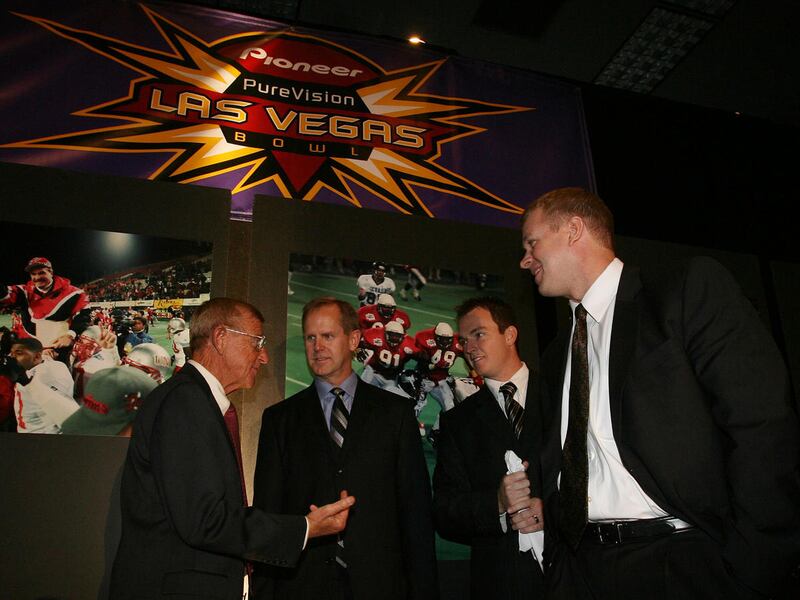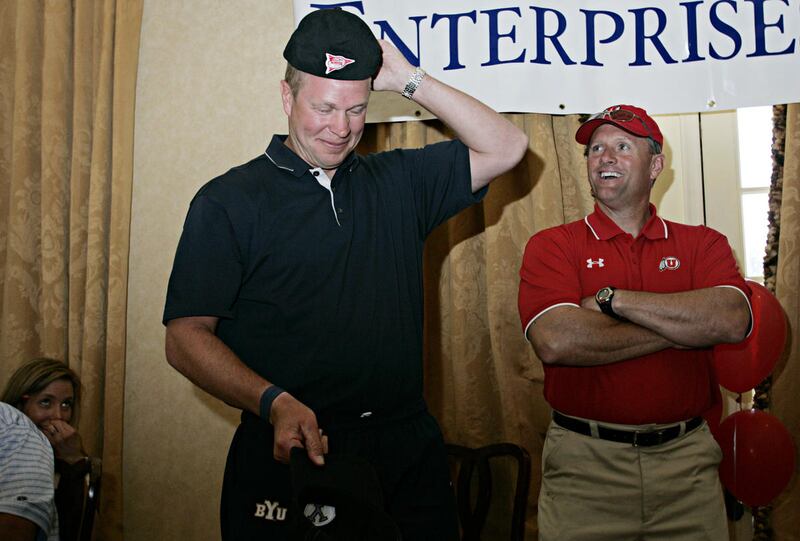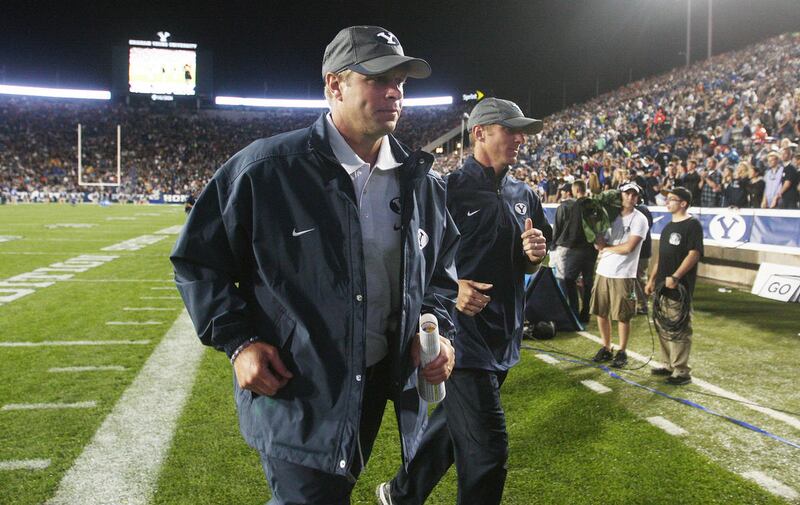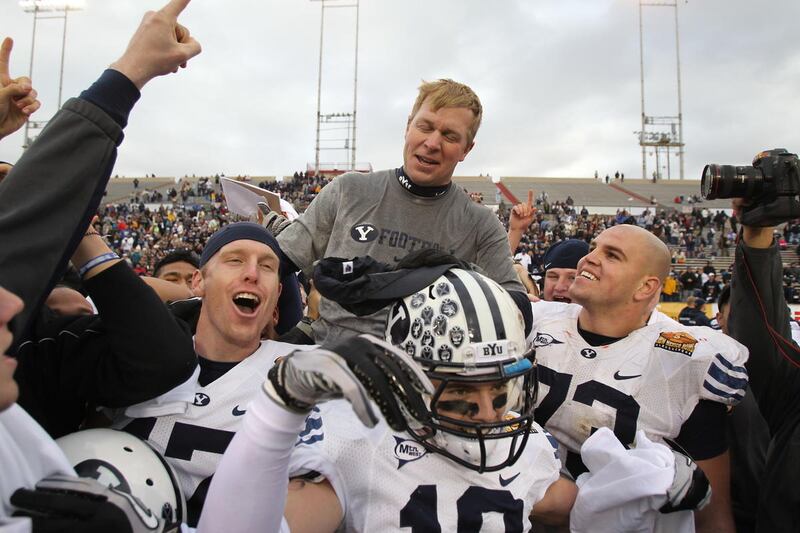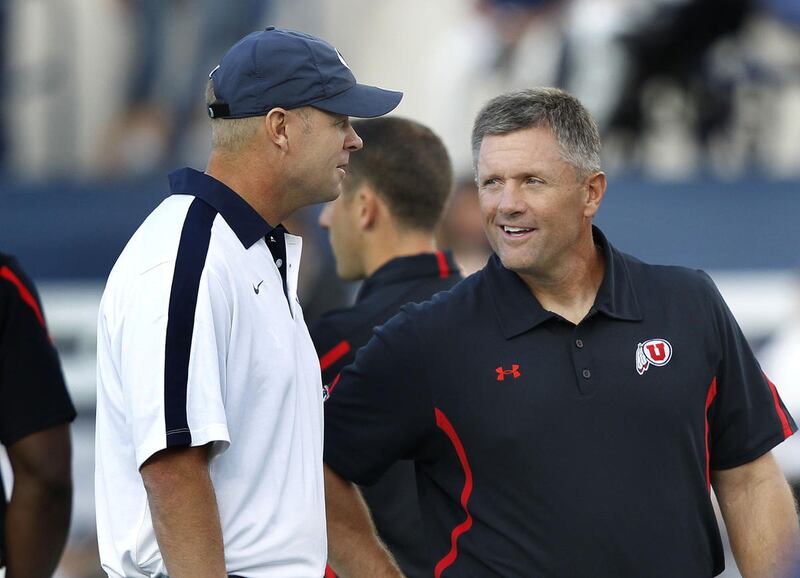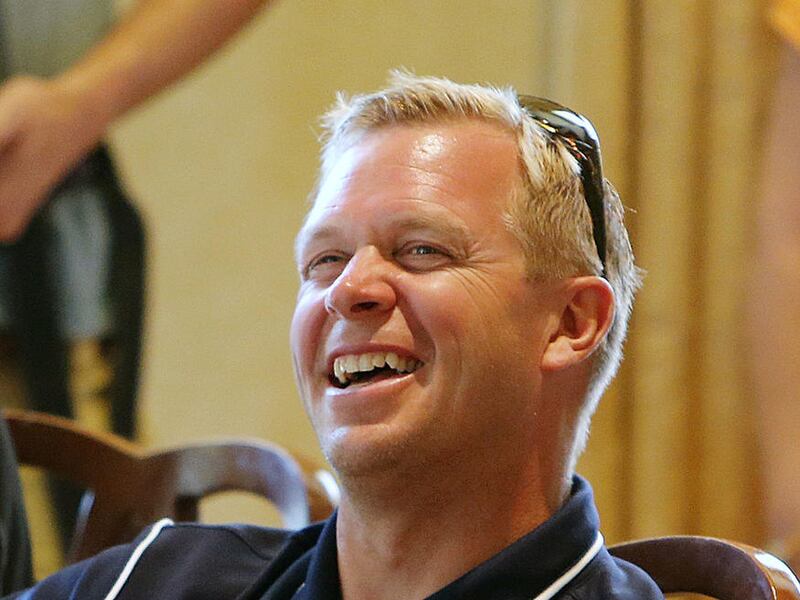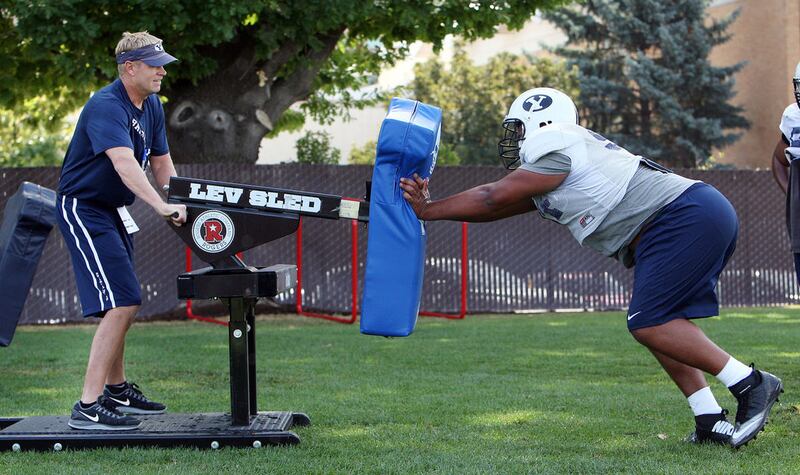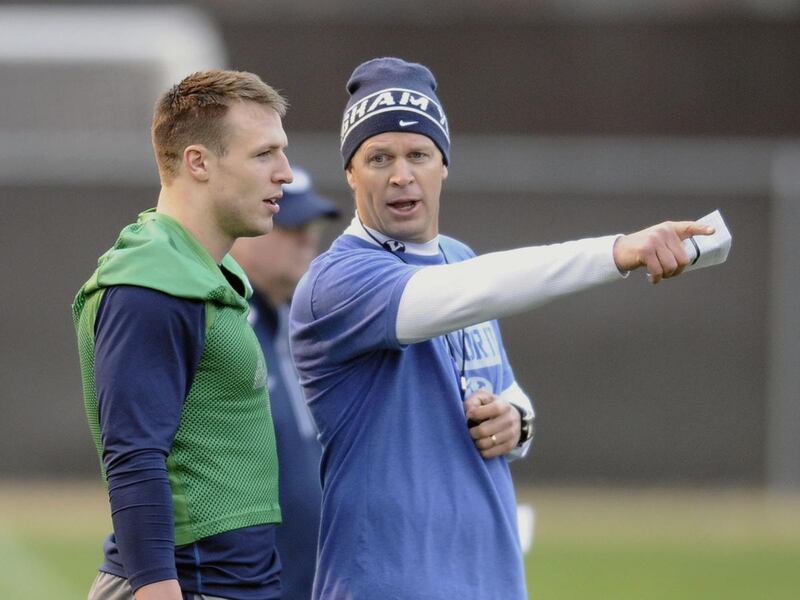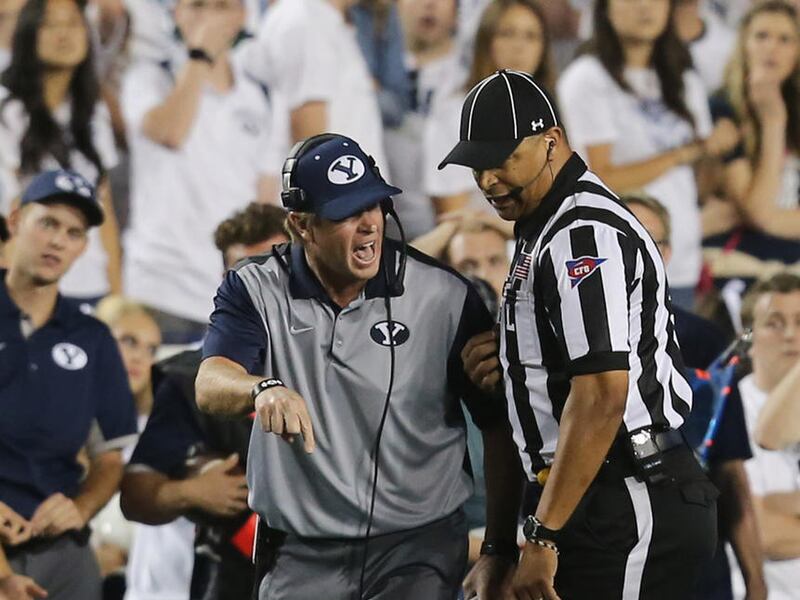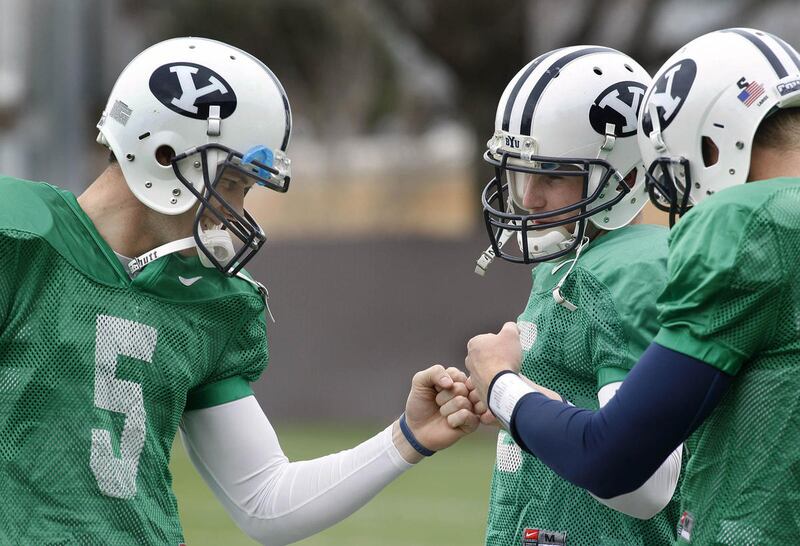He had a policy in place, a vision in mind. A very detailed plan. Then he instituted it. He was very detailed in what he wanted to do. He didn’t get tired. He just worked and worked. – BYU assistant coach Paul Tidwell
PROVO — On a cold, overcast February afternoon more than a decade ago, Bronco Mendenhall sat in his office, optimistically laying out his vision of BYU football to a visitor.
Two months earlier, Mendenhall, then 39 years old, had been promoted to head coach of a program that was mired in the throes of three consecutive losing seasons. An ugly off-field incident involving players six months earlier had given the program, and the university, a black eye.
Those were dark times for BYU football, and Mendenhall was hired to clean up the mess and bring hope back to Provo.
Under arduous circumstances, he wanted to restore glory to a dilapidated program.
"I think we're the flag-bearer of the institution," he said on that February day, six months before his first game as a head coach against Boston College. "I'm passionate about my faith and I'm passionate about principles of truth and virtue and character. Those things represent BYU and BYU's football program. We're on the front line, representing all of those things. I intend to carry that flag up high, not on the ground. If I do my job right, this place will be one of the most dominant programs in the country, as it once was. I simply go one day at a time, one task at a time, one project at a time in an attempt to build this program to the greatness that it once knew. I have a very clear idea of what the expectation is. I have a very clear idea of what the demand is and what BYU football is supposed to be. With every ounce of energy that I have and every bit of ability I've been blessed with, I'm driven to return it to that place."
Mendenhall had his detractors at that time, who pointed out that he had never been a head coach before and that he was the second-youngest head coach in Division I football. In his coaching career, he had only been involved in one bowl game.
Eleven years later, as Mendenhall prepares to become the head coach at Virginia after he coaches the Cougars in the Las Vegas Bowl against Utah on Dec. 19, it’s debatable whether he reached all of his objectives.
But there’s no doubt that he lifted the program out of ignominious depths as he guided BYU to 11 straight bowl games while never experiencing a losing season.
Two years after being hired, Mendenhall directed the Cougars to an 11-2 record and a Mountain West Conference championship in 2006. He followed that up with another 11-2 season and another league title in 2007. Under Mendenhall, BYU has posted five top-25 finishes in the national rankings.
In recent years, as he navigated the program through the choppy waters of independence, the Cougars have not reached the 11-win plateau, although if they can beat the Utes in the Las Vegas Bowl, it will mark their 10th victory. That BYU has nine wins is an impressive feat considering the Cougars were without their starting quarterback, Taysom Hill, and starting running back, Jamaal Williams. A win in the bowl game would also give Mendenhall (99-42) 100 for his career.
What is Mendenhall’s legacy at BYU? Here are the views from a variety of perspectives.
The athletic director
Tom Holmoe was not yet the athletic director when he hired Mendenhall on Dec. 13, 2004. It wasn’t until months later that he got the gig. But as an athletic department employee charged with finding a new head coach, Holmoe invited Mendenhall, who was serving as the defensive coordinator at the time, to interview for the job after Gary Crowton, Mendenhall’s friend and mentor, had resigned under pressure.
Mendenhall, upset about Crowton’s departure, was abrasive in the first round of interviews. In a subsequent interview, Mendenhall wowed administrators with his vision for the program.
Utah’s Kyle Whittingham was the first to be offered the job in 2004. Holmoe says while Mendenhall wasn’t the top pick, he was the right pick.
“It’s funny how some people report that Bronco was the ‘default coach’ when we hired him. That’s far from the truth,” Holmoe said. “He might not have been the first choice, but when he was hired, right from the start, we had some experiences that were so unique that started it off. In the 11 years we’ve been together, with him at the helm of this team, lives have changed and he positively influenced so many of our student-athletes. So much of his production is not on the field. The public never gets to see so much of what he’s done here. …
“I measure the successes off the field, the anecdotes and stories and images that I’ve seen over the years with this team,” Holmoe continued. “One thing that jumped into my mind was ‘Thursday’s Heroes,’ a program Bronco started. Our team has been able to meet and love some people that need support and are going through challenges. To see our players grasp onto that program and to see their faces, that’s part of Bronco’s legacy. Years from now, it just gets stronger.”
The quarterback
If there’s one player that epitomized, and mirrored, BYU’s turnaround in the mid-2000s, it was quarterback John Beck, who struggled with injuries and multiple setbacks in his first two seasons in Provo.
“I remember what it was like when I committed to BYU, and LaVell Edwards, and what I wanted my experience to be like. In those first two seasons I was there, they fell short of that feeling that I wanted,” Beck recalled. “When Bronco took over, I remember the vision he had for the program. I didn’t know what to expect. He didn’t know exactly what it was going to look like at the end, but he had an idea of what he wanted to go towards. The first thing was he saw things had been lost. It started with bringing back the old, traditional ‘Y’ logo. Bronco wanted to make this a special place. He made BYU what I wanted it to be when I committed there. Something needed to be changed. There were things wrong with the program but there were so many good players. … Bronco told us, ‘If you as a player work hard, are dedicated and sacrifice and invest your full effort, this is what can happen if you line those pieces up.’”
With a first-year head coach in Mendenhall, a first-year offensive coordinator in Robert Anae, and a first-year quarterback coach in Brandon Doman, it took a while for the offense to overcome growing pains early on.
But Beck ended his career with a sensational senior campaign, capped by a dramatic win at Utah, snapping a four-game losing streak to the Utes, on the final play of the game with an improbable and memorable touchdown pass to Jonny Harline. Then Beck led BYU to a 38-8 victory over Oregon in the Las Vegas Bowl in his final game.
“I feel like I have a unique relationship with Bronco because I got to be his first quarterback and team captain,” Beck said. “The program has come so far. He’s built a program of wins and bowl games. We worked together when this rebuilding thing was happening. There’s more to Bronco than what he did for me as a football player. It’s what he did for me as a person.”
The walk-on
The first time Parker Mangum, the older brother of current BYU quarterback Tanner Mangum, introduced himself to Mendenhall after making the team as a walk-on, Mendenhall uttered a few words that stuck with Mangum.
“He didn’t know who I was. I wanted to thank him and shake his hand,” Parker Mangum remembered. “The first words he said to me was, ‘Well, this isn’t for everyone.’ Then he turned and walked away. At first, I wondered why he would say that. What it taught me was, this is a special place. It isn’t for anyone. If you want to be here, it’s up to you. I had to prove that I belonged. If not for those words, who knows if I would have made it the whole way. I’ll never forget that.”
Mangum, who graduated in 2009, was one of many walk-ons that Mendenhall welcomed to the program, players who were passionate about BYU football. Mendenhall turned many of them into key contributors.
The most famous of those walk-ons, of course, is defensive lineman Ezekiel Ansah, the Ghana native who ended up as the first-round, No. 5 overall NFL draft pick of the Detroit Lions in 2013.
“He brought out the best in his players. I saw so much growth in myself and in others,” said Mangum, who now works for Nike. “He was not just a coach but a father figure to many of us. We talked with him in his office about football, life, school. He was a great sounding board. When we cried, he cried with us. When we laughed, he laughed with us. He had a fun way to diffuse tension. He commanded respect but at the same time he had a dry sense of humor that put us at ease that not many people get to see. I would not be where I am today without what Bronco instilled in me while I was at BYU.”
Mangum said he enjoyed the pre-game firesides — which have drawn big crowds to LDS Church chapels around the country — the “Thursday’s Heroes” program; and the annual Eco-Challenge, which pitted players against coaches in feats of endurance.
“I’ll remember the inspirational moments as much as I’ll remember ‘fourth-and-18’ and ‘Andrew George is still running,’ against Utah” he added. “Those are big moments on the field, but I’ll remember the off-the-field moments.”
The alums
While linebacker/defensive lineman Brady Poppinga loved playing under Mendenhall during the coach’s two years as defensive coordinator at BYU from 2003-04, he regrets he didn’t get to play for Mendenhall when he was the head coach.
“His legacy is that he should go down as one of the best coaches in the history of BYU football, if not the best,” Poppinga said of Mendenhall. “I would say that not out of disrespect for LaVell Edwards, but out of the fact that Bronco had to deal with a higher degree of difficult challenges than LaVell had to. The best example of that is, LaVell had more NFL talent than Bronco did.”
Poppinga said he and other defensive players at BYU recognized Mendenhall’s leadership abilities before he became a head coach.
“As defensive players, we had seen in him his greatness, though our record didn’t reflect that. His success was never a shock to me," Poppinga said. "When BYU beat TCU in 2006, I felt validated, that he could do wonders in the BYU environment. I realized my intuition was right. It wasn’t big overall changes, just small tweaks. It wasn’t like the program was in total disarray. There was a strong foundation that carried over from LaVell’s years. He embraced that, while Crowton tried to separate himself from that. And that’s the most impressive part about it, right? Crowton wanted to separate himself because of insecurity while Bronco looked at it as a position of strength, standing on the shoulders of what LaVell accomplished rather than trying to reinvent the wheel.”
Associate athletic director and former BYU tight end Chad Lewis never played for Mendenhall, but he respects what he accomplished.
“Unbelievable consistency,” Lewis said of Mendenhall’s legacy. “Coaches around the country and doing whatever they can to get 11 wins. He’s been a consistent winner, which is extremely difficult to do. He’s done that. I think people do appreciate what he’s done, they will appreciate him more as the years go by.”
What made Mendenhall successful?
“Bronco has a lot more drive coming from a fire inside,” Lewis said. “That drive he has, probably something he had from a little kid, is what helped him be the great coach that he is. I think it’s remarkable that he has put in front of the world the competitive advantage of who we are, what we represent and how important that really is. He hasn’t hid from that or worked around it. He has embraced it and made it our competitive advantage. That, to me, is pretty incredible.”
The longtime assistants
Only two assistant coaches have been at BYU for all 11 years of Mendenhall’s tenure — inside linebackers coach Paul Tidwell and defensive line coach Steve Kaufusi. They have shared many ups and downs over the years.
Tidwell remembers the early days of Mendenhall at the helm.
“One thing I remember when Bronco was hired is he said he would never get tired,” Tidwell said. “He had a policy in place, a vision in mind. A very detailed plan. Then he instituted it. He was very detailed in what he wanted to do. He didn’t get tired. He just worked and worked.”
In 2010, BYU opened the season 1-4 when he fired defensive coordinator Jaime Hill and took over the defense.
“I remember that practice when we came back,” Tidwell said. “Bronco almost ran the players to death. They ran and ran and ran. This was his way of getting the culture back. We were going to have guys on the field who try hard. The players responded well. It goes to show his charisma, his leadership and passion for coaching defense.”
BYU finished that season with six wins in the final eight games and the defense not only played better, but it played with more passion and intensity — attributed to Mendenhall’s dedication to maximizing his players’ effort and potential.
The senior defensive star
BYU defensive lineman Bronson Kaufusi is a senior, which means he’ll be concluding his career with Mendenhall in the Las Vegas Bowl.
As the son of coach Steve Kaufusi, Bronson understands something about the pressure of being a coach, as well as the lasting impact a coach can make on his players — and a program.
"Bronco, he came in and changed everything. Where the program is at is great, and it will continue to get better,” Kaufusi said. “That's one of the attributes of a great leader — when they leave, can the boat still sail? I know Bronco is a great leader, so I know this team, this program, will continue to progress and really improve. … I love coach Mendenhall. He has turned me into who I am and who I am going to be. I am going to miss him here at BYU and I know that at Virginia, they are really lucky to have a coach like coach Mendenhall.”
EMAIL: jeffc@deseretnews.com


